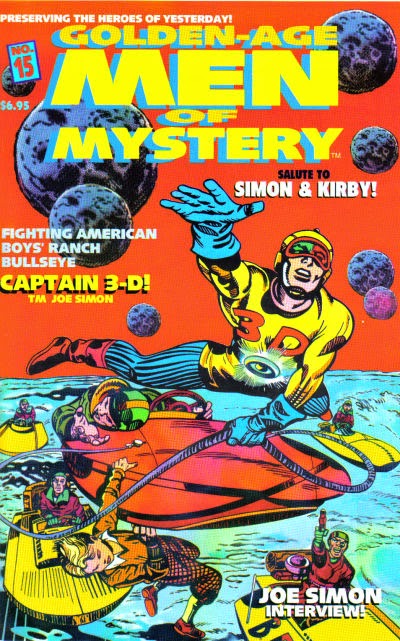Saturday, May 2, 2015
The Book Of D!
For any fan of the work Joe Simon and Jack Kirby one oddity that always pops up is the single issue of Harvey's Captain 3-D from 1953. What we have is a full-blown superhero adventure, the first costumed hero the team had produced since the ill-fated Stuntman for Harvey many many years before. What we have is a comic which makes pretty good use of a trendy technique which from time to time captures the whimsy of pop culture. Sadly what we don't have is a very good comic book story.
Captain 3-D was one of several 3-D offerings from the company when the technique caught fire in the early 50's. But just as fast as it blazed into being it sputtered out. Harvey comics went away from the idea arguably because the craze was short-lived but also because they came under legal scrutiny for the way in which they used the technology which other comics publishers claimed was poaching. Whatever the reasons, the story of Captain 3-D lasted one single issue.
Briefly the tale is about a young lad named Danny Davis who is given a mysterious book by a mysterious man who is promptly melted into nothingness by another mysterious figure who likewise goes up in smoke, thus making Danny's pleas to the police seem like tomfoolery. But soon when he is alone he activates "The Book of D" by putting on some weird glasses and out of the pages leaps a costumed hero named Captain 3-D who immediately battles some thugs who are breaking into Danny's digs. After dispatching the baddies the Captain explains to Danny that the book is a relic of an ancient time and place dubbed "The Land of D" when the Captain's people (of whom he is the last survivor) and the "Cat People" battled for control of the world. Both were seemingly destroyed but not before the Captain was hidden as a safeguard in the book which had been passed down for generations beginning in mankind's prehistoric past.
In the two remaining stories Captain 3-D emerges to battle Tigra the queen of the Cat People and a mobster by the name of "Ironhat McGinty" (because he has an iron cap surgically implanted in his noggin no less).
And that was that. To read the complete issue check this out, but bring your handy 3-D specs if you want to enjoy it completely.
There was going to be a second issue of Captain 3-D but it was scotched. The artwork for the cover of that never was comic was at long last published in 1999 by AC Comics for an issue of Golden Age Men of Mystery. The issue featured a lot of unpublished art for that book as well other features on the work of Simon and Kirby for Harvey Comics.
The demise of Captain 3-D was the end of 3-D superheroes until a typically nostalgic Roy Thomas concocted a 1950's based retro-hero by the on-the-nose name of "The 3-D Man". He appeared in a couple of issues of Marvel Premiere before falling into the gigantic pool of Marvel continuity and eventually becoming part of the Avengers in an issue of What If?. The debut issue of the character even sported a very dynamic Kirby cover.
Meanwhile, famed fandom and underground artist Richard "Grass" Green took the general notion of a world inhabited by a covert animal species and gave us Xal-Kor the Human Cat. Xal-Kor's ongoing battles with the "Rat People" are very similar to the scenario birthed by Simon and Kirby so many years before.
Jack "King" Kirby on the other hand created another 3-D comic titled Battle for a Three-Dimensional World, this 1982 effort is another one-shot written by 3-D guru Ray Zone and featuring the superhero Stereon battling the evil queen Circe to save the lovely Videora. It's a visual feast, but a mediocre adventure at best.
And that sums up how I feel about Captain 3-D too, an interesting curiosity, but less effective because of the special effects than without them. Reading the story sans the 3-D effects the panels are woefully static (for logical reasons) and that undermines the general fluid tendencies of the usual Simon and Kirby effort. Also the story of Captain 3-D himself is in places robust but overall cumbersome and if it had been given a few more outings would've in my opinion worn itself out purely in narrative terms.
Captain 3-D is a lovely image, a great icon of a long lost time when we like to imagine life was simpler to understand, but aside from that nostalgic impulse, he's a mildly mediocre hero, and not up to the usual standards of Simon and Kirby.
Or course he would be followed by brief flourishes on The Fly and Lancelot Strong, The SHIELD for MLJ, but he was one of the last projects the important team worked on together until many decades later when they reunited for an issue of the revived Sandman for DC. Joe Simon went on to other projects eventually becoming the editor of Sick magazine and Jack Kirby found his way to DC again working in relative anonymity until the Challengers of the Unknown and later his legendary stint with Stan Lee at Marvel.
But that's a whole bunch of other stories.
Rip Off








Captain 3D also features the first professional work of Steve Ditko, who inked a lot of the backgrounds.
ReplyDelete